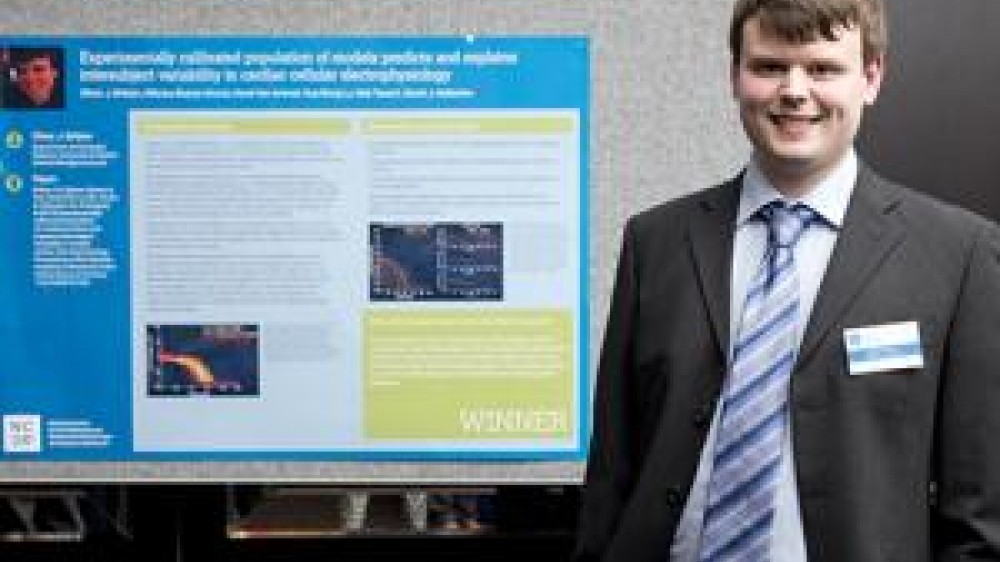Looking back at the 3Rs Prize: interview with last year’s winner, Dr Oliver Britton

With the deadline for this year’s 3Rs Prize nominations approaching, we got in touch with 2014 winner, Dr Oliver Britton from University of Oxford, to discuss his experience of the process, winning and his year since.
Dr Britton was the first PhD student to win the prize, for his work under the supervision of Dr Alfonso Bueno-Orovio and Professor Blanca Rodriguez. The awarded paper described an improved computer modelling of cardiac activity that better reflected the differences among patients.
The 3Rs Prize is awarded to original papers with great 3Rs potential, and the 2015 competition is now open. The deadline for applications is Thursday 19 November, for more information and guidance, please visit www.nc3rs.org.uk/3rsprize
What made you apply for the 3Rs Prize?
Alfonso, one of my PhD supervisors, had heard of the prize previously and mentioned to me that I should apply. I wrote the application not expecting our paper to have much chance of winning, as I don't think the prize had ever been awarded to a computational study before. Myself and my supervisors, Blanca and Alfonso, were stunned when we found out that we had won the grand prize!
Had you heard of the 3Rs before applying?
I was aware of the 3Rs before I applied, primarily in terms of replacement, as we had thought about the potential of our work to allow the replacement of some of the animal experiments that are currently used in drug safety testing. We had also developed software to allow our methodology to be used by the pharmaceutical industry, particularly by those who didn't have specialist training in computational modelling. However, I wasn't aware of organisations like the NC3Rs that specifically supported work that could advance the 3Rs until Alfonso introduced me to the prize competition.
What have you been up to since winning the award?
At the same time as the prize was awarded I was finishing writing my thesis, so the period around then was very busy! Since finishing my PhD in May, I have been working to develop a new project in the field of pain research which builds on my PhD work and is a really exciting new area for me. I'm investigating how variability in the electrical properties of the sensory neurons in your body that transmit pain signals to the spinal cord alters their excitability, and their response to certain types of painkilling drugs. Current studies of pain are often performed using rat and mouse models. However, I'm using computational models integrated with data from human sensory neurons. This approach allows us to capture human-specific physiology in our models, maximise the information we get from scarce human data, and in the future could potentially replace some of the use of animal models in pain research and drug development.
How has the award affected your career?
Having our work recognised by the 3Rs Prize was great and it was a big confidence booster to see our work's potential applications appreciated by a panel of scientists with a diverse range of interests. Personally, it's also allowed me to pursue the project in pain research which would have been difficult without the Prize funding.
Giving the short talk about my work at the Prize event was also a valuable experience, giving me the opportunity to present my work to a diverse and distinguished audience, although it was a little nerve-wracking at the time!
What are your plans for the future?
If possible, I want to stay in academic research, I'm currently planning on applying for funding to continue the work in pain that's being funded by the 3Rs Prize, in an effort to continue the work. Beyond that, I'm not sure, I enjoy combining research in physiological and biomedical science with computational modelling so that's what I would like to keep doing, whether it's going back to work on the heart, continuing in pain research, or exploring a new area.
Do you have any advice for the applicants in 2015 edition?
Apply! Even if you're not sure whether your work is the type of work that could win, or that has won the prize in the past. We assumed we had a very low chance of being successful as I believe none of the previous winners were computational modelling papers. But if we hadn't applied, then we wouldn't have had any chance of winning.
Apart from that, I would try to think about how your work can advance the 3Rs outside of your particular field. Our paper focused on cardiac electrophysiology and cardiac drug safety, but the methodology we developed can and is being used for modelling in other areas, such as pain research, and we highlighted this, which I think was an important factor in our paper winning last year.
